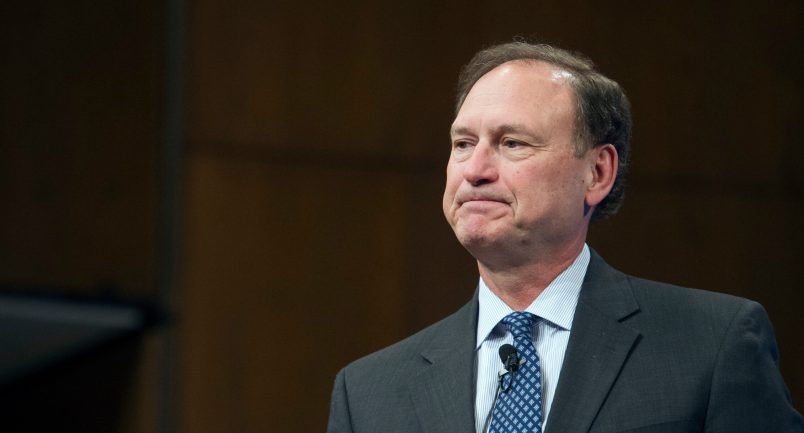Democrats on the Senate Judiciary Committee asked Chief Justice John Roberts to “take appropriate steps” so that Justice Samuel Alito would recuse himself from a tax case that the Court agreed to hear next term, as well as any cases involving laws that regulate the High Court.
“The Court is mired in an ethical crisis of its own making, yet its only response has been a weak statement on ethics that Justice Alito has apparently ignored,” the letter reads.
The letter refers to an interview which Alito gave to two writers: the Wall Street Journal’s editorial features editor, and David Rivkin, an attorney with business before the Court who has contributed to the paper’s opinion section.
The interview was published as a column Friday that lavished attention and praise on Alito, depicting him as a forthright truth-teller, the only justice with a strong enough conscience and the urgency needed to fight back against what the conservative writers characterized as a “political onslaught” against the Court.
Rivkin is not just a contributor to the paper’s opinion pages — he is also part of a legal team representing plaintiffs in the Moore v. U.S. case, which the Court will hear next term and which asks the court to reimagine the basis for much of the tax code. Rivkin’s side is asking the Court to rewrite the modern definition of “income” for tax purposes — a decision that Rivkin himself has described in the Wall Street Journal as an attempt to have the High Court prevent Congress from passing any future wealth tax.
In the letter asking for recusal, Senate Democrats avoided any mention of the wealth tax, but rather focused on the appearance of a conflict of interest which they said Alito’s interview to Rivkin generated.
They wrote that Rivkin’s “efforts to help Justice Alito air his personal grievances could cast doubt on Justice Alito’s ability to fairly discharge his duties” in the Moore case.
Alito lashed out in the interview at proposals from congressional Democrats to pass a code of ethics which would apply to all justices on the Court.
“I know this is a controversial view, but I’m willing to say it,” Alito told his two interviewers. “No provision in the Constitution gives them the authority to regulate the Supreme Court — period.”
Democrats also said in the letter that they believed Alito’s remarks “violated a key tenet” of the statement on ethics that the Court issued in response to recent criticism, which prohibits the creation of an “appearance of impropriety” or a conflict of interest. The code defines that as “when an unbiased and reasonable person who is aware of all relevant facts would doubt that the Justice could fairly discharge his or her duties.”
Ethics experts differed when asked by TPM last week about whether Alito’s apparently free real estate in the Wall Street Journal opinion section was of great enough value to cast doubt on Alito’s impartiality.







first
I look forward to the day when the Supreme Court is no longer the chief defender of corruption.
Sweet Jeezus on a Cracker! This shouldn’t even be an issue. Sam’s gotta go! It’s past time for an impeachment hearing (or two, three).
Alito doesn’t recuse, he refuses!
The Senate Dems should probably have also asked for help getting Alito to resign his seat. They would be ignored on that as well.
Alito is a bad apple.